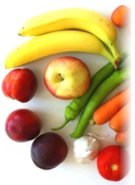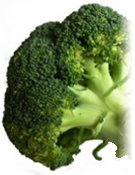Guide to Fighting Cancer
How to Reduce Your Risk of Cancer by Making Better Food Choices
The impact of food choices on a person's risk of developing cancer is astounding. In Western countries, over 30% of all cancers have been estimated to be directly or indirectly linked to the food choices we make. Here you will find a bevy of resources designed for people who are interested in reducing their risk of cancer naturally through diet.
Under normal conditions, the cells that make up your body grow, divide, and die in a controlled manner. Cancer develops when some of these cells begin to grow out of control due to damaged DNA. Instead of dying, these cells outlive normal cells, invade adjacent tissues, and sometimes spread to other parts of the body via lymph or blood (a process called metastasis).
Although there are many kinds of cancer, they all start because of abnormal cell growth. Cancers usually form a tumor. However, not all tumors are cancerous. Benign tumors are abnormal growths that are self-limited and that do not intrude into surrounding tissue or spread to other parts of the body.
As of 2007, cancer is the second leading cause of death in the United States, after heart disease. Nearly half of all men and about a third of all women in the United States will develop cancer during their lifetimes. Cancer treatment includes surgery (removing the malignant tumor and the surrounding affected tissue), chemotherapy (treatment by chemicals that destroy cells), and the killing of tumor cells by using radiation.
The role of diet in the development of cancer has been researched since the 1940s. In Western countries, over 30% of all cancers have been estimated to be directly or indirectly linked to dietary factors. Cancers that are believed to be particularly sensitive to dietary factors include esophageal, gastrointestinal, breast, bladder, lung, prostate, and cervical cancers.
The purpose of this online guide is to share nutrition-related tips that can help you reduce your risk of cancer. To get started, check out the diet, food and recipe sections of this guide below. Note that this guide focuses on overall cancer prevention; if you are looking for diet-related tips on how to reduce your risk of a specific type of cancer, condition-specific guides to the following types of cancer are also available: breast cancer, cervical cancer, colon cancer, lung cancer, pancreatic cancer, prostate cancer, skin cancer, and gastric cancer.

16 Diet Tips for Cancer Prevention
In the diet section of HealWithFood.org's Guide to Cancer Prevention, we look at how certain dietary factors – such as choosing low GI foods over high GI foods, avoiding dietary nitrates, limiting alcohol consumption, and cutting down on excess protein – may help reduce your risk of developing cancer. View Diet Tips
View Diet Tips
List of the 26 Best Cancer Fighting Foods
Learn how raspberries, asparagus, onions, horseradish, celery, broccoli and 20 other extraordinary foods can contribute to natural cancer prevention. As you'll see, most of the anti-cancer foods are common foods that can be found at your local grocery store. View Food List
View Food List
Collection of Anti-Cancer Recipes
How about some beet and carrot soup which is naturally rich in betacyanin and falcarinol, two phytochemicals that have shown significant promise for reducing the risk of cancer? Or perhaps a bowl of dairy-free blueberry muesli which draws on the strong anti-cancer and antioxidant properties of wild blueberries? To view the recipes for these and other anti-cancer dishes, click on the link below. View Recipes
View Recipes








